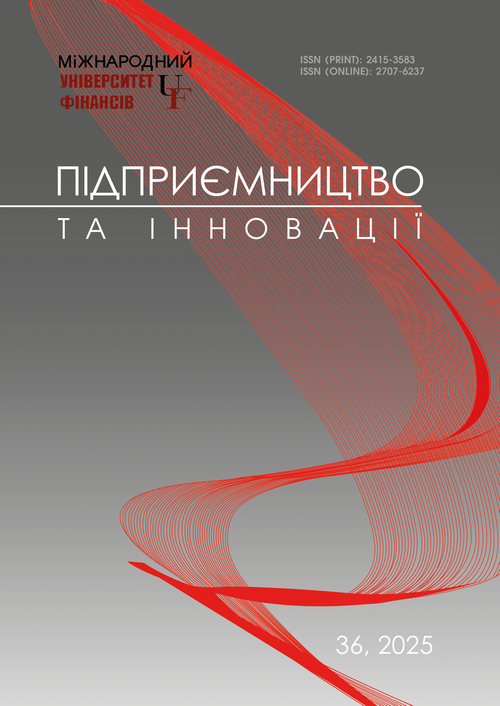ДВІ ЕПОХИ ПОТРЯСІНЬ: ВЕЛИКА ДЕПРЕСІЯ 1930-Х ПРОТИ ГЛОБАЛЬНОЇ КРИЗИ XXI СТОЛІТТЯ
Анотація
У контексті зростаючої турбулентності світової економіки, обумовленої фінансовими, епідеміологічними та геополітичними шоками, постає актуальна потреба у глибокому переосмисленні історичного досвіду антикризового управління. Велика депресія 1930-х років та глобальні кризи XXI століття мають спільні риси й суттєві відмінності, які дозволяють сформулювати уроки для сучасної міжнародної макроекономічної координації. Проаналізовано та порівняно причини, механізми поширення, політичні відповіді та економічні наслідки великих глобальних криз з акцентом на роль міжнародних економічних відносин. У результаті дослідження встановлено, що хоча Велика депресія і кризи XXI століття мали різну природу (банківську, споживчу, структурну), всі вони супроводжувалися порушенням довіри, торговельним спадом і дефіцитом міжнародної координації. У XXI столітті значну роль відіграли гнучкі інструменти стимулювання, інституційна реакція центральних банків, антикризові пакети G20 та адаптація глобального ланцюга поставок. Проте посилення протекціонізму, фінансова фрагментація та політична поляризація створюють нові загрози.
Посилання
Bernanke, B. S. (2014). The Great Depression: Lessons for Today. Economic Theory, Vol. 56, No. 3, pp. 5–19.
International Monetary Fund. (2023). World Economic Outlook 2023: Navigating Global Divergences. Washington, D.C. URL: https://www.imf.org/en/Publications/WEO
Рогов Є. А. Світові економічні кризи: історія, механізми, наслідки / Є. А. Рогов. Харків : Видавництво «Факт», 2021. 288 с.
World Bank. (2024). Global Economic Prospects, January 2024. Washington, D.C. URL: https://www.worldbank.org/en/publication/global-economic-prospects
World Trade Organization. (2023). World Trade Statistical Review: July 2023. DOI: https://doi.org/10.30875/9789287074195
Український інститут майбутнього. Війна і трансформація глобальної економіки: звіт аналітичного центру. Київ : УІМ, 2023. 62 с.
Eichengreen, B. J. (2015). Hall of Mirrors: The Great Depression, the Great Recession, and the Uses—and Misuses—of History History / B. Eichengreen. Oxford: Oxford University Press, pp. 512.
G20 Bali Leaders’ Declaration 2022. Bali, Indonesia, 15-16 November 2022. URL: https://www.g20.org/
Keynes, J. M. (1936). The General Theory of Employment, Interest and Money / J. M. Keynes. London: Macmillan, pp. 403.
Krugman, P. R. (2009). The Return of Depression Economics and the Crisis of 2008 / P. R. Krugman. New York: W.W. Norton & Company, pp. 210.
Bernanke, B. S. (2014). The Great Depression: Lessons for Today. Economic Theory, vol. 56, no. 3, pp. 5–19.
International Monetary Fund (2023). World Economic Outlook 2023: Navigating Global Divergences. Washington, D.C. Available at: https://www.imf.org/en/Publications/WEO
Rohov, Y. A. (2021). Svitovi ekonomichni kryzy: istoriia, mekhanizmy,
naslidky [World Economic Crises: History, Mechanisms, Consequences]. Kharkiv: Fakt Publishing House, pp. 288. (in Ukrainian)
World Bank. (2024). Global Economic Prospects, January 2024. Washington, D.C. Available at: https://www.worldbank.org/en/publication/global-economic-prospects
World Trade Organization. (2023). World Trade Statistical Review: July 2023. DOI: https://doi.org/10.30875/9789287074195
Ukrainian Institute for the Future. (2023). Viina i transformatsiia hlobalnoi ekonomiky: Zvit analitychnoho tsentru [War and the Transformation of the Global Economy: Report of the Analytical Center]. Kyiv: UIM, pp. 62. (in Ukrainian)
Eichengreen, B. J. (2015). Hall of Mirrors: The Great Depression, the Great Recession, and the Uses — and Misuses — of History / B. Eichengreen. Oxford: Oxford University Press, pp. 512.
G20 Bali Leaders’ Declaration 2022. Bali, Indonesia, 15-16 November 2022. Available at: https://www.g20.org/
Keynes, J. M. (1936). The General Theory of Employment, Interest and Money / J. M. Keynes. London: Macmillan, pp. 403.
Krugman P. R. (2009). The Return of Depression Economics and the Crisis of 2008 / P. Krugman. New York: W.W. Norton & Company, pp. 210.



